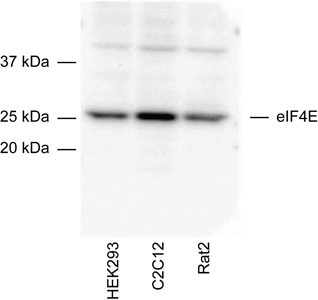Anti-eIF4E [4GRH08] Antibody
This antibody was raised in mice against human eukaryotic initiation factor 4E (eIF4E) that was expressed in and purified from Sf9 cells.
The initiation of translation is an important biological event and a variety of factors contribute to this process. Members of the Eukaryotic initiation factor 4 (eIF4) translation factor family bind to the 5' mRNA cap and unwind the mRNA secondary structure. All eukaryotic cellular mRNAs are blocked at their 5-prime ends with the 7-methyl-guanosine cap structure. This structure is involved in several cellular processes including enhanced translational efficiency, splicing, mRNA stability, and RNA nuclear export.
eIF4E is a eukaryotic translation initiation factor involved in directing ribosomes to the cap structure of mRNAs. eIF4E's function is to bind an mRNA cap and ultimately bring it to the ribosome. eIF4E is part of the eIF4F pre-initiation complex, which is made up of eIF4E, and eIF4G. Almost all cellular mRNA's require eIF4E in order to be translated into protein.
From the laboratory of Scot R. Kimball, PhD, Penn State College of Medicine
 Part of The Investigator's Annexe program.
Part of The Investigator's Annexe program.
This antibody was raised in mice against human eukaryotic initiation factor 4E (eIF4E) that was expressed in and purified from Sf9 cells.
The initiation of translation is an important biological event and a variety of factors contribute to this process. Members of the Eukaryotic initiation factor 4 (eIF4) translation factor family bind to the 5' mRNA cap and unwind the mRNA secondary structure. All eukaryotic cellular mRNAs are blocked at their 5-prime ends with the 7-methyl-guanosine cap structure. This structure is involved in several cellular processes including enhanced translational efficiency, splicing, mRNA stability, and RNA nuclear export.
eIF4E is a eukaryotic translation initiation factor involved in directing ribosomes to the cap structure of mRNAs. eIF4E's function is to bind an mRNA cap and ultimately bring it to the ribosome. eIF4E is part of the eIF4F pre-initiation complex, which is made up of eIF4E, and eIF4G. Almost all cellular mRNA's require eIF4E in order to be translated into protein.
From the laboratory of Scot R. Kimball, PhD, Penn State College of Medicine
 Part of The Investigator's Annexe program.
Part of The Investigator's Annexe program.
| Product Type: | Antibody |
| Name: | Anti-eIF4E monoclonal antibody (4GRH08) |
| Accession ID: | P06730 |
| Host: | Mouse |
| Isotype: | IgG |
| Clonality: | Monoclonal |
| Clone Name: | 4GRH08 |
| Specificity: | This antibody recognizes human, mouse, rat, and pig eIF4E |
| Immunogen: | Whole protein |
| Format: | Liquid |
| Purification Method: | HiTrap Protein G HR chromatography |
| Tested Applications: | Western blotting, ELISA, IP, and IF. |
| Concentration: | 0.5mg/mL |
| Amount: | 200ul |
| Storage: | Store at 4C |
| Shipped: | Cold packs |

Western Blot: The blot shown above was incubated with anti-eIF4E antibody at a 1:3,000 dilution followed by secondary antibody (Bethyl Laboratory) at a 1:10,000 dilution. The blot was developed with ECL reagent. Equal amounts of protein from HEK293 (human), C2C12 (mouse), and Rat 2 (rat) were analyzed.
- Sukarieh, R., et al. The eIF4E-binding proteins are modifiers of cytoplasmic eIF4E relocalization during the heat shock response. Am J Physiol. 296:C1207-17. 2009.
- Rong, L., et al. Control of eIF4E cellular localization by eIF4E-binding proteins, 4E-BPs. RNA. 14: 1318-27. 2008.
- Ferraiuolo MA, Basak S, Dostie J, Murray EL, Schoenberg DR, Sonenberg N. A role for the eIF4E-binding protein 4E-T in P-body formation and mRNA decay. J Cell Biol. 2005 Sep 12;170(6):913-24.
- Kimball, S.R., et al. A microtiter plate assay for assessing the interaction of eukaryotic initiation factor eIF4E with eIF4G and eIF4E binding protein-1. Anal Biochem. 325: 364-8. 2004.
- Kimball, S.R., et al. Mammalian stress granules represent sites of accumulation of stalled translation initiation complexes. Am J Physiol 284: C273 - 84. 2003.
- Kimball, S.R., et al. Insulin stimulates protein synthesis in skeletal muscle by enhancing the association of eIF-4E and eIF-4G. Am J Physiol 272: C754 - 9. 1997.
If you publish research with this product, please let us know so we can cite your paper.

![Anti-eIF4E [4GRH08] Antibody Anti-GFP (Chicken-Standard) Antibody](https://www.kerafast.com/MediaStorage/Product/Images/Medium/113_200120200125541120D.jpg)
